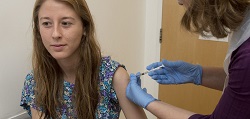 |
| A volunteer gets GSK's Ebola vaccine during a Phase I trial at the University of Oxford.--Courtesy of the University of Oxford |
GlaxoSmithKline ($GSK) is testing its Ebola jab in Africa to see if it provokes an immune response strong enough to successfully beat an Ebola infection. But if it turns out to be too weak, never fear--the Big Pharma has a backup plan. It's teaming up with Maryland-based Emergent BioSolutions ($EBS) to test the latter's Ebola shot as a booster for its own vaccine.
Emergent announced on Monday that under multiple agreements with the University of Oxford, Glaxo, and the NIH's National Institute of Allergy and Infectious Diseases (NIAID), it had manufactured an Ebola candidate, called a modified vaccinia Ankara Ebola Zaire vaccine, or MVA EBOZ. It will be tested with Glaxo's candidate in a Phase I trial at the University of Oxford.
The MVA EBOZ vaccine is made with a scalable process, which "has the potential to meet the demand for multi-million doses in a few months," Emergent said in a statement.
Glaxo is not the only company to go the booster route. Johnson & Johnson (J&J) and partner Bavarian Nordic may have been third to bring an Ebola vaccine to human trials, but they were first to develop a two-dose regimen, the "prime-boost" vaccine. As the name suggests, the first dose primes the immune system and the second boosts the immune response. While a booster could improve the immune response, a two-dose vaccine could complicate mass immunization.
A number of other companies are working on Ebola vaccines, but Merck ($MRK) and NewLink ($NLNK) are the only others testing their candidate in Africa. Profectus BioSciences nabbed funding from BARDA last year to take its candidate into clinical trials, while Maryland-based Novavax ($NVAX) is working on a nanoparticle jab.
- here's the release
Special Report: 10 drugs that could stop Ebola